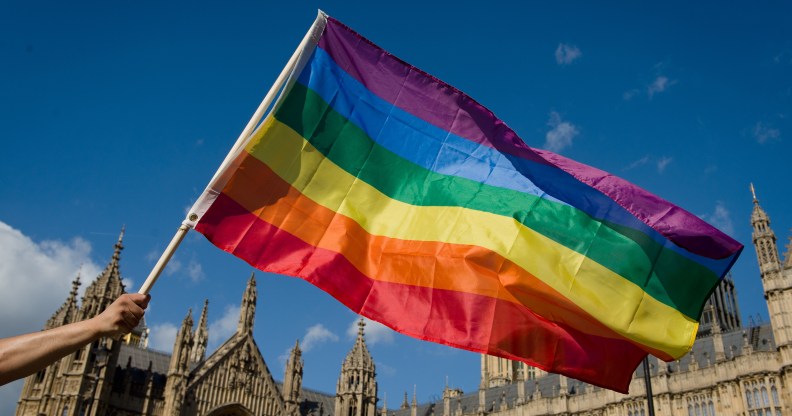Human fertilisation bill passes first Commons test

A protester holds a rainbow flag outside the Houses of Parliament in central London on June 3, 2013, as protesters gather in support of same-sex marriage (LEON NEAL/AFP/Getty Images)
The Human Fertilisation and Embryology Bill passed its first stage in the House of Commons by 340 votes to 78, a majority of 262.
The bill would ensure equality for lesbians when accessing fertility treatments. It also allows for the creation of animal-human embryos for research purposes.
The bill would seek to remove the requirement for doctors to “consider the need for a father” when deciding to consent to IVF or assisted conception treatments, replacing it with a need for “supportive parenting.”
Transport Secretary Ruth Kelly, who was criticised during her time as Equality minister because she had previously never voted for gay rights, stayed away from the vote.
However, other Labour MPs were vocal in their opposition. Geraldine Smith said that removing the need for a father was “one of the most ill-conceived measures to be put before this House while I’ve been a member of it.”
Health Secretary Alan Johnson said research would be subject to a “strict legal and ethical framework.”
Nine Labour MPs voted against the government today: Joe Benton (Bootle), Tom Clarke (Coatbridge, Chryston & Bellshill), Claire Curtis-Thomas (Crosby), David Drew (Stroud), Paul Farrelly (Newcastle-under-Lyme), Andrew Mackinlay (Thurrock), George Mudie (Leeds East), Geraldine Smith (Morecambe & Lunesdale), David Taylor (Leicestershire North West).
At Easter the leader of Scotland’s Roman Catholics, Cardinal Keith O’Brien, claimed that the Human Fertilisation and Embryology Bill will create “Frankenstein-like” human-animal hybrid embryos, a charge rejected by the government and scientists.
He accused Prime Minister Gordon Brown of: “promoting a bill which denies that a child has a biological father, allows tampering with birth certificates, removing biological parents, and inserting someone altogether different.”
The Cardinal also accused the government of trying to challenge “standards by which we have lived throughout our lives and by which Christians have lived for the past 2,000 years” and of not responding to the church’s concerns.
In November 2006 Cardinal O’Brien compared same-sex partnerships to paedophilia and also spoke against gay adoption.
The government’s position remains that given the legal recognition of civil partnerships and laws preventing discrimination on the grounds of gender and sexual orientation, retaining any provision that mentioned a mother and a father is inconsistent with the wider government policy of promoting equality.
In March the Prime Minister’s spokesman called the bill “an important piece of Government business; it was in the Queen’s Speech and it was the Prime Minister’s view that it was important that the bill as a whole was passed.”
He pointed out that all Labour MPs would be expected to support the bill as a whole during today’s second reading and its later stages.
“We had always said that this would be treated as government business but we would find a mechanism by which individual MP’s could express their conscience and that was what we were doing,” he said.
Labour MPs will be allowed a free vote on two other clauses in the Human Fertilisation and Embryology Bill during next week’s committee stage.
One allows the creation of human-animal embryos for medical research and the other the creation of so-called “savour siblings,” who would aid a sick brother or sister.

